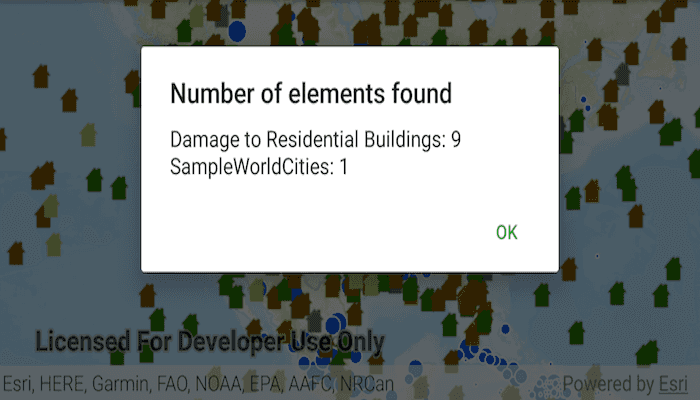Identify features in all layers in a map.

Use case
IdentifyLayers allows users to tap on a map, returning features at that location across multiple layers. Because some layer types have sublayers, the sample recursively counts results for sublayers within each layer.
How to use the sample
Tap to identify features. An alert will show all layers with features under the tapped location, as well as the number of features.
How it works
- The tapped position is passed to
MapView.identifyLayersAsync - For each
IdentifyLayerResultin the results, features are counted.- Note: there is one identify result per layer with matching features; if the feature count is 0, that means a sublayer contains the matching features.
Relevant API
- IdentifyLayerResult
- IdentifyLayerResult.getSublayerResults
- MapView.identifyLayersAsync
Additional information
The GeoView supports two methods of identify: identifyLayerAsync(), which identifies features within a specific layer and identifyLayersAsync(), which identifies features for all layers in the current view.
Tags
identify, recursion, recursive, sublayers
Sample Code
/* Copyright 2017 Esri
*
* Licensed under the Apache License, Version 2.0 (the "License");
* you may not use this file except in compliance with the License.
* You may obtain a copy of the License at
*
* http://www.apache.org/licenses/LICENSE-2.0
*
* Unless required by applicable law or agreed to in writing, software
* distributed under the License is distributed on an "AS IS" BASIS,
* WITHOUT WARRANTIES OR CONDITIONS OF ANY KIND, either express or implied.
* See the License for the specific language governing permissions and
* limitations under the License.
*
*/
package com.esri.arcgisruntime.sample.identifylayers;
import java.util.ArrayList;
import java.util.List;
import java.util.concurrent.ExecutionException;
import android.content.DialogInterface;
import android.os.Bundle;
import android.util.Log;
import android.view.MotionEvent;
import android.widget.Toast;
import androidx.appcompat.app.AlertDialog;
import androidx.appcompat.app.AppCompatActivity;
import com.esri.arcgisruntime.ArcGISRuntimeEnvironment;
import com.esri.arcgisruntime.concurrent.ListenableFuture;
import com.esri.arcgisruntime.data.FeatureTable;
import com.esri.arcgisruntime.data.ServiceFeatureTable;
import com.esri.arcgisruntime.geometry.Point;
import com.esri.arcgisruntime.geometry.SpatialReference;
import com.esri.arcgisruntime.layers.ArcGISMapImageLayer;
import com.esri.arcgisruntime.layers.FeatureLayer;
import com.esri.arcgisruntime.mapping.ArcGISMap;
import com.esri.arcgisruntime.mapping.BasemapStyle;
import com.esri.arcgisruntime.mapping.Viewpoint;
import com.esri.arcgisruntime.mapping.view.DefaultMapViewOnTouchListener;
import com.esri.arcgisruntime.mapping.view.IdentifyLayerResult;
import com.esri.arcgisruntime.mapping.view.MapView;
public class MainActivity extends AppCompatActivity {
private final String TAG = MainActivity.class.getSimpleName();
private ArcGISMapImageLayer mMapImageLayer;
private MapView mMapView;
@Override
protected void onCreate(Bundle savedInstanceState) {
super.onCreate(savedInstanceState);
setContentView(R.layout.activity_main);
// authentication with an API key or named user is required to access basemaps and other
// location services
ArcGISRuntimeEnvironment.setApiKey(BuildConfig.API_KEY);
mMapView = findViewById(R.id.mapView);
// create an instance of a map
ArcGISMap map = new ArcGISMap(BasemapStyle.ARCGIS_TOPOGRAPHIC);
// map image layer
mMapImageLayer = new ArcGISMapImageLayer(getString(R.string.world_cities));
mMapImageLayer.addDoneLoadingListener(() -> {
// hide Continent and World layers
mMapImageLayer.getSubLayerContents().get(1).setVisible(false);
mMapImageLayer.getSubLayerContents().get(2).setVisible(false);
});
map.getOperationalLayers().add(mMapImageLayer);
// feature table
FeatureTable featureTable = new ServiceFeatureTable(getString(R.string.damage_assessment));
// feature layer
FeatureLayer featureLayer = new FeatureLayer(featureTable);
// add feature layer add to the operational layers
map.getOperationalLayers().add(featureLayer);
// set initial viewpoint to a specific region
mMapView.setViewpoint(
new Viewpoint(new Point(-10977012.785807, 4514257.550369, SpatialReference.create(3857)), 68015210));
// assign map to the map view
mMapView.setMap(map);
// add a listener to detect taps on the map view
mMapView.setOnTouchListener(new DefaultMapViewOnTouchListener(this, mMapView) {
@Override public boolean onSingleTapConfirmed(MotionEvent e) {
android.graphics.Point screenPoint = new android.graphics.Point(Math.round(e.getX()),
Math.round(e.getY()));
identifyResult(screenPoint);
return true;
}
});
}
/**
* Performs an identify on layers at the given screenpoint and calls handleIdentifyResults(...) to process them.
*
* @param screenPoint in Android graphic coordinates.
*/
private void identifyResult(android.graphics.Point screenPoint) {
final ListenableFuture<List<IdentifyLayerResult>> identifyLayerResultsFuture = mMapView
.identifyLayersAsync(screenPoint, 12, false, 10);
identifyLayerResultsFuture.addDoneListener(new Runnable() {
@Override public void run() {
try {
List<IdentifyLayerResult> identifyLayerResults = identifyLayerResultsFuture.get();
handleIdentifyResults(identifyLayerResults);
} catch (InterruptedException | ExecutionException e) {
Log.e(TAG, "Error identifying results: " + e.getMessage());
}
}
});
}
/**
* Processes identify results into a string which is passed to showAlertDialog(...).
*
* @param identifyLayerResults a list of identify results generated in identifyResult().
*/
private void handleIdentifyResults(List<IdentifyLayerResult> identifyLayerResults) {
StringBuilder message = new StringBuilder();
int totalCount = 0;
for (IdentifyLayerResult identifyLayerResult : identifyLayerResults) {
int count = geoElementsCountFromResult(identifyLayerResult);
String layerName = identifyLayerResult.getLayerContent().getName();
message.append(layerName).append(": ").append(count);
// add new line character if not the final element in array
if (!identifyLayerResult.equals(identifyLayerResults.get(identifyLayerResults.size() - 1))) {
message.append("\n");
}
totalCount += count;
}
// if any elements were found show the results, else notify user that no elements were found
if (totalCount > 0) {
showAlertDialog(message);
} else {
Toast.makeText(this, "No element found", Toast.LENGTH_SHORT).show();
Log.i(TAG, "No element found.");
}
}
/**
* Gets a count of the GeoElements in the passed result layer.
*
* @param result from a single layer.
* @return the total count of GeoElements.
*/
private int geoElementsCountFromResult(IdentifyLayerResult result) {
// create temp array
List<IdentifyLayerResult> tempResults = new ArrayList<>();
tempResults.add(result);
// using Depth First Search approach to handle recursion
int count = 0;
int index = 0;
while (index < tempResults.size()) {
// get the result object from the array
IdentifyLayerResult identifyResult = tempResults.get(index);
// update count with geoElements from the result
count += identifyResult.getElements().size();
// if sublayer has any results, add result objects in the tempResults array after the current result
if (identifyResult.getSublayerResults().size() > 0) {
tempResults.add(identifyResult.getSublayerResults().get(index));
}
// update the count and repeat
index += 1;
}
return count;
}
/**
* Shows message in an AlertDialog.
*
* @param message contains identify results processed into a string.
*/
private void showAlertDialog(StringBuilder message) {
AlertDialog.Builder alertDialogBuilder = new AlertDialog.Builder(this);
// set title
alertDialogBuilder.setTitle("Number of elements found");
// set dialog message
alertDialogBuilder
.setMessage(message)
.setCancelable(false)
.setPositiveButton("Ok", new DialogInterface.OnClickListener() {
@Override public void onClick(DialogInterface dialog, int id) {
}
});
// create alert dialog
AlertDialog alertDialog = alertDialogBuilder.create();
// show the alert dialog
alertDialog.show();
}
@Override
protected void onPause() {
super.onPause();
mMapView.pause();
}
@Override
protected void onResume() {
super.onResume();
mMapView.resume();
}
@Override
protected void onDestroy() {
super.onDestroy();
mMapView.dispose();
}
}